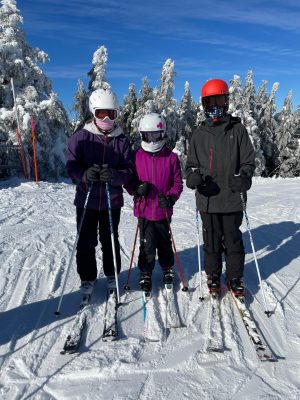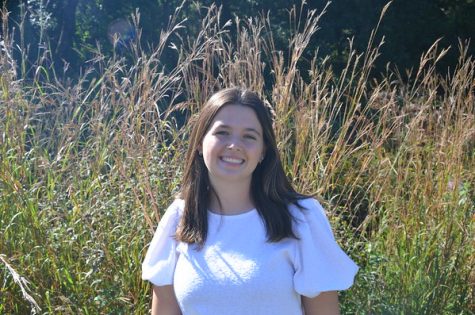Traveling protocols strike WHS students’ February vacation plans
Credit: Courtesy of Maggie Melander
Freshman Maggie Melander traveled to the U.S. Virgin Islands with her immediate family and cousins for February break. “The process to go to the virgin islands was very serious,” Melander said. “You have to get tested a couple of days prior to your trip and fill out a lot of papers saying that you got tested, and [we] had to have those in hand when going through security and [to our gate].”
March 4, 2021
Many WHS students look forward to February break as an opportunity to destress and escape the unrelenting weather of New England and find some warmth. However, the Coronavirus pandemic has polarized students on whether they think traveling is a safe thing to do right now. Because of this, many still embarked on an adventure, but in a much different way.
Plane travel, in general, can cause anxiety, but now with close seats, confined spaces and mask-wearing, this has only exacerbated the fears of many. Airlines have had to adapt to regulations and protocols put in place to accommodate passengers as safely as possible. Freshman Maggie Melander went to the U.S. Virgin Islands with her family during break and was nervous about the flight there.
“I was very, very nervous to fly on a plane because of how many germs are in the airport, let alone the plane as well,” Melander said. “The airports were very sanitary along with the plane, and we were given several wipes when we got onto the plane to wipe down our seats. The airport and the airlines took serious precautions by having stickers on the floor for where to stand safely [and] checking our temperatures throughout the experience.”
After reopening for travelers on Saturday, Sept. 19, 2020, the U.S. Virgin Islands have required certain COVID-19 testing for anyone entering the islands. To gain entry into the U.S. Virgin Islands, a traveler must get tested with a viral test one to three days prior to your trip.
“The process to go to the virgin islands was very serious as well,” Melander said. “You have to get tested a couple of days prior to your trip and fill out a lot of papers saying that you got tested, and [we] had to have those in hand when going through security and [to our gate]. Along with that, we had to send all of our travel info to the virgin islands, so they could approve us to come.”
As a part of WHS protocol, Melander got another COVID-19 test after her trip, so she could return to school as safely as possible while not risking any spread of the virus amongst the WHS community.
“As for when we got home, my whole family got tested right away, and after receiving all negative tests, my parents contacted the school to ask if we [could] come to school, and they said ‘yes,’” Melander said.

Sophomore Hannah Gordon is another WHS student who traveled during the break. However, unlike Melander, Gordon did not fly to her destination. Instead, Gordon and her family drove to Okemo, Vermont, to ski for six days.
“Skiing during COVID-19 is different because you can’t bring anything into the lodge,” Gordon said. “You have to change into your boots in the parking lot or before you get there, and you have to carry your skis and poles to the mountain and get on a chairlift right away. It’s also a lot less crowded because you need a reservation to go, and they limit the number of people.”
Eating in the ski lodge also came with a new set of procedures to comply with social distancing.
“In order [to] eat in or go into the lodge, you needed a reservation,” Gordon said. “After each 30-minute reservation, an employee would clean the table. They spaced out all the tables in the lodge so that they were at least six feet apart. All of the check-in areas and food court cashiers had plastic shields in between you and the employees.”
After sending her negative COVID-19 test to the school after her trip, Gordon returned to WHS on the week of Feb. 22.
Many Wayland families still do not feel comfortable traveling given the circumstances right now. Sophomore Lucy Grasso is a part of these said families. Grasso’s family decided to stay home during break instead of going anywhere.
“My family would have [traveled if not for COVID-19] because the sports season had ended, so there were no conflicts, and pretty much every other year we have gone on vacation during [Feb. break],” Grasso said. “We probably would have traveled to North Carolina to visit my grandfather or gone somewhere tropical. I stayed at home for most of the week other than the few times I saw people socially distanced.”
With experts encouraging people to stay home and limit their travel to only essential matters, some Wayland residents are bothered by those who chose to travel out of leisure, but Grasso said she didn’t mind as long as the travelers adhered to safety guidelines.
“As long as they followed the traveling guidelines and got tested or quarantined, I’m not super bothered by it,” Grasso said.





![Last Wednesday, the Wayland School Committee gathered to discuss a number of topics regarding the health curriculum and Innovation Career Pathway course. Another large topic of conversation was the ways to potentially mitigate distracting cell phone usage. "These [phones] are going to distract your learning and social relationships," Superintendent David Fleishman said. "That's concrete right there."](https://waylandstudentpress.com/wp-content/uploads/2025/06/Screenshot-2025-06-04-at-9.49.31 PM-1200x886.png)



























![Troy Hoyt finishes the Boston Marathon, running for the Hoyt Foundation. T. Hoyt is the son of Hoyt Foundation CEO Russ Hoyt.
“[Running a marathon] might seem like a big thing, when it’s presented to you at first, but if you break it up and just keep telling yourself, “Yes, you can,” you can start chipping away at it. And before you know it, you’ll be running the whole 26 miles, and you won’t even think twice about it.” T. Hoyt said.](https://waylandstudentpress.com/wp-content/uploads/2025/04/C36E8761-1CBB-452E-9DF2-543EF7B1095E_1_105_c.jpeg)











































![Freshman Maggie Melander traveled to the U.S. Virgin Islands with her immediate family and cousins for February break. “The process to go to the virgin islands was very serious,” Melander said. “You have to get tested a couple of days prior to your trip and fill out a lot of papers saying that you got tested, and [we] had to have those in hand when going through security and [to our gate]."](https://waylandstudentpress.com/wp-content/uploads/2021/02/x1epCiE50EgawOC1IQZzgAOa6vDR8IEQMTAuL6I3-2-900x600.jpeg)

